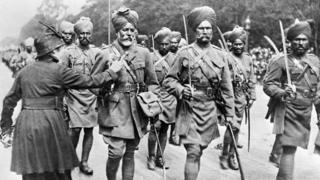- UID
- 20
- Online time
- Hours
- Posts
- Reg time
- 24-8-2017
- Last login
- 1-1-1970
|

▼ Approximately 1.3 million Indian soldiers served in World War One - and more than 74,000 of them lost their lives.
It's 100 years since the armistice of 11 November 1918 ended what was once called "the war to end all wars". But there are still many untold stories about the Indian Army from the conflict - personal accounts that show how global the war was, and how extraordinary Indian experiences were.
Historian George Morton-Jack relates some of these stories.
• Arsala Khan
Of all the Indian troops who fought between 1914 and 1918 - there were four times as many as those from Australian, New Zealand, Canada, South Africa and the Caribbean combined - Arsala Khan of the 57th Wilde's Rifles was the first to go into battle.
He led the troops of the first Indian company to enter the British trenches on the western front, in Belgium on the night of 22 October 1914.
Arsala Khan went on to serve until 1918, in France, Egypt, German East Africa and India. Then, in the summer of 1919, he represented his regiment in London at the official Indian victory parade.
With a thousand other Indian veterans, he marched past the city's greatest war monument, the Cenotaph, where many of them broke into tears.
• Amar Singh
World War One's great Western writers - from Wilfred Owen and Winston Churchill to Siegfried Sassoon and many more - have long been among the most famous.
But there was one writer in the Indian Army who wrote something perhaps even more extraordinary: Captain Amar Singh penned what is possibly the world's longest diary.
Spanning 89 volumes from the 1890s to the 1940s, Singh's incredible diary covers his experience of the war from India to the western front and Britain, and on to the Iraq front, with his troopship dodging German U-boats in the Mediterranean along the way.
Singh finished the war back in India, where in 1917 his wife, Rasal, gave birth at their home in Rajasthan to their daughter Ratan.
The baby girl was their sixth child and the first to survive disease in infancy, giving them new hope for a happy post-war family life.
• Kasturba Gandhi
Kasturba Gandhi was with her husband Mahatma Gandhi in England when World War One broke out.
Together they volunteered as auxiliary hospital workers among the Allied troops in western Europe.
In 1914-15, Kasturba Gandhi worked in Indian Army hospitals - on England's southern coast - set up for some 16,000 Indian soldiers who had been wounded in France and Belgium.
"Mrs Gandhi was particularly anxious to see that no Indian patient suffered or felt embarrassed on those delicate questions of caste distinctions," wrote Daya Ram Thapar, a fellow Indian medical volunteer at the hospitals.
"She undertook to look after the feeding of seriously ill orthodox patients and often used to clean their utensils if they objected to being fed by non-Hindus."
• Awal Nur (▪ ▪ ▪)
► Please, read the full note here: Source |
|